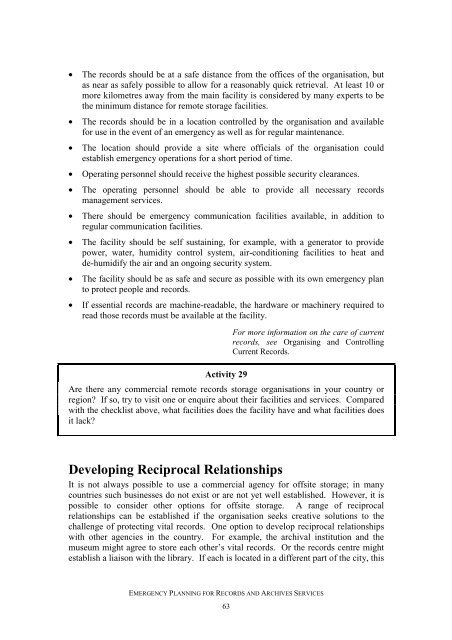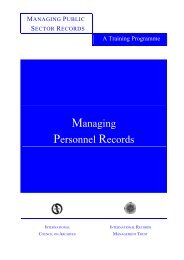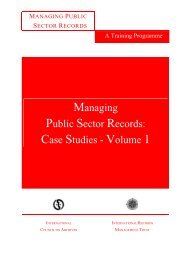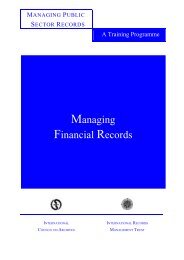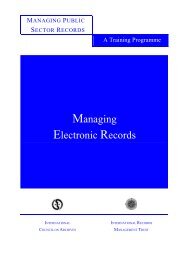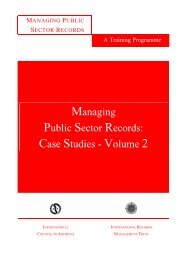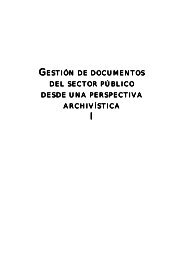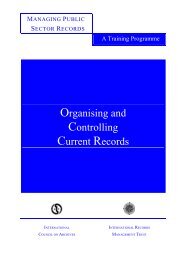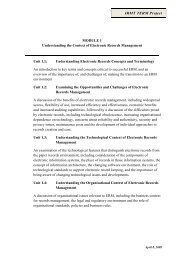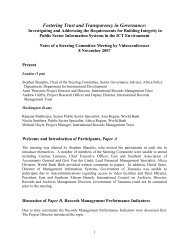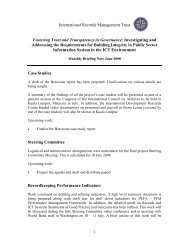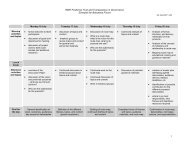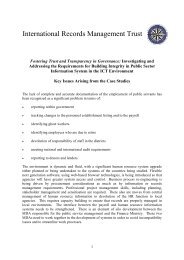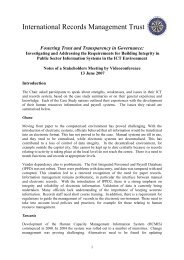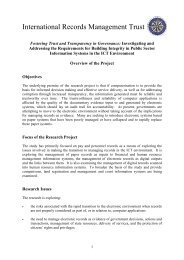disaster planning and control - International Records Management ...
disaster planning and control - International Records Management ...
disaster planning and control - International Records Management ...
Create successful ePaper yourself
Turn your PDF publications into a flip-book with our unique Google optimized e-Paper software.
• The records should be at a safe distance from the offices of the organisation, but<br />
as near as safely possible to allow for a reasonably quick retrieval. At least 10 or<br />
more kilometres away from the main facility is considered by many experts to be<br />
the minimum distance for remote storage facilities.<br />
• The records should be in a location <strong>control</strong>led by the organisation <strong>and</strong> available<br />
for use in the event of an emergency as well as for regular maintenance.<br />
• The location should provide a site where officials of the organisation could<br />
establish emergency operations for a short period of time.<br />
• Operating personnel should receive the highest possible security clearances.<br />
• The operating personnel should be able to provide all necessary records<br />
management services.<br />
• There should be emergency communication facilities available, in addition to<br />
regular communication facilities.<br />
• The facility should be self sustaining, for example, with a generator to provide<br />
power, water, humidity <strong>control</strong> system, air-conditioning facilities to heat <strong>and</strong><br />
de-humidify the air <strong>and</strong> an ongoing security system.<br />
• The facility should be as safe <strong>and</strong> secure as possible with its own emergency plan<br />
to protect people <strong>and</strong> records.<br />
• If essential records are machine-readable, the hardware or machinery required to<br />
read those records must be available at the facility.<br />
For more information on the care of current<br />
records, see Organising <strong>and</strong> Controlling<br />
Current <strong>Records</strong>.<br />
Activity 29<br />
Are there any commercial remote records storage organisations in your country or<br />
region? If so, try to visit one or enquire about their facilities <strong>and</strong> services. Compared<br />
with the checklist above, what facilities does the facility have <strong>and</strong> what facilities does<br />
it lack?<br />
Developing Reciprocal Relationships<br />
It is not always possible to use a commercial agency for offsite storage; in many<br />
countries such businesses do not exist or are not yet well established. However, it is<br />
possible to consider other options for offsite storage. A range of reciprocal<br />
relationships can be established if the organisation seeks creative solutions to the<br />
challenge of protecting vital records. One option to develop reciprocal relationships<br />
with other agencies in the country. For example, the archival institution <strong>and</strong> the<br />
museum might agree to store each other’s vital records. Or the records centre might<br />
establish a liaison with the library. If each is located in a different part of the city, this<br />
EMERGENCY PLANNING FOR RECORDS AND ARCHIVES SERVICES<br />
63


